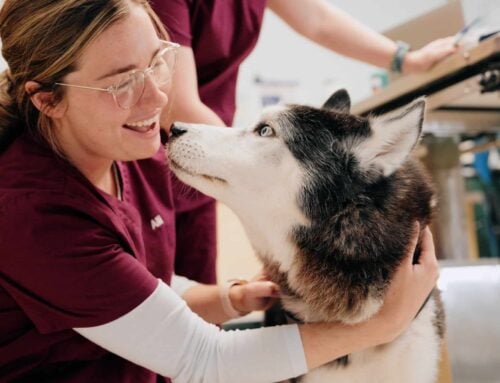If your pet’s kidneys become diseased, they can experience a cascade of health issues that lead to a poor quality of life. While chronic kidney disease (CKD) has no cure, the condition can be successfully managed to provide your pet with several months and potentially years of a comfortable quality of life. Learn how our Shuler Veterinary Clinic team diagnoses CKD through early detection screening tests to offer your four-legged friend the most effective management strategy.
#1: Your pet’s kidneys perform myriad essential functions
Kidneys are the workhorses of the body’s filtration system and are essential for removing metabolic wastes and toxins from the bloodstream. In addition to filtering waste products, your pet’s kidneys:
- Balance electrolyte and fluid levels
- Stimulate red blood cell production
- Regulate blood pressure
- Conserve water
- Produce urine
#2: Kidney disease in pets has many causes
Healthy kidneys are essential to your pet’s quality of life, but many diseases and issues can affect their functioning. In some cases, acute kidney failure can progress to a chronic condition, especially if it goes untreated. While age is CKD’s primary risk factor, other causes can trigger this condition, including:
- Diabetes
- Heart disease
- Hypertension
- Autoimmune diseases
- Severe urinary infections
- Leptospirosis
- Chemical exposure
- Toxin ingestion
- Certain medications
- Tumors
- Anatomic problems
- Breed predisposition
#3: Your pet may have chronic kidney disease long before they exhibit signs
CKD can slowly progress as your pet ages, and your dog or cat may not exhibit signs for a long time. In addition, an affected pet will not exhibit signs until they have lost two-thirds of their kidney function.
Although destroyed kidney tissue does not regenerate, these organs have a tremendous reserve capacity to continue functioning even after being damaged. Once the kidneys reach the tipping point, when they have lost two-thirds to three-quarters of their function, signs become evident and may include:
- Excessive thirst
- Increased urine output and frequency
- Inappropriate urination
- Nausea
- Vomiting
- Inappetence
- Lethargy
- Weakness
- Muscle wasting
- Weight loss
- Bad breath
- Pale gums
- Oral ulcers
- Unkempt hair coat
- Vision loss (often caused by secondary hypertension)
The kidneys’ inability to filter toxins and concentrate urine spurs the disease signs, so an affected pet drinks more in an attempt to flush out waste products. Their urine becomes dilute, they have an unquenchable thirst, and they exhibit behavior changes.
#4: Screening for chronic kidney disease in pets can be challenging
While a pet who has CKD does not exhibit signs until much of their kidney function has diminished, their diagnostic screening test results do not indicate a change before real damage has occurred. Although standard wellness screening tests are an important part of your pet’s preventive care, additional, more advanced testing is often recommended for at-risk pets. Standard wellness screening tests include:
- Complete blood count (CBC) — A quantitative analysis of red blood cells, white blood cells, and platelets, a CBC can determine if your pet has developed anemia secondary to CKD, or whether an infection caused kidney damage. Dehydration may also be evident on CBC results.
- Blood chemistry panel — A blood chemistry panel analyzes organ function. If your pet’s kidneys are not functioning properly, elevations in two enzymes—creatinine and blood urea nitrogen (BUN)—will occur. However, these values do not change until two-thirds to three-quarters of your pet’s kidney function is lost, corresponding with when they exhibit signs.
- Urinalysis — By closely examining a urine sample, our team can assess your pet’s urine concentration and pH, and determine whether protein is present. A urinalysis can also detect infection, blood, crystals, or cells that indicate kidney damage.
#5: Advanced kidney testing detects disease in pets much earlier
Senior pets, cats, and pets who have chronic illnesses that can cause kidney damage should undergo more advanced kidney disease testing. In addition to standard wellness tests, our team can perform a specialized kidney function test—the symmetric dimethylarginine (SDMA) assay, which identifies kidney damage much earlier in the disease process than a CBC and blood chemistry panel. SDMA is an amino acid created from protein metabolism that the kidneys typically excrete, so this biomarker level increases with kidney dysfunction.
Checking your pet’s SDMA level in addition to regular blood work is important because other conditions that may cause increased creatinine levels (e.g., liver disease, heart disease, Cushing’s disease, muscle wasting) do not affect SDMA. One study proved that SDMA levels could be used to detect kidney disease 17 months earlier than by measuring creatinine levels alone.
The best way to manage your pet’s chronic disease is through early detection and intervention. Keep a close eye on your pet’s kidney function and overall health by ensuring they have regular wellness screening tests. To schedule your furry pal’s appointment, give our Shuler Veterinary Clinic team a call, or book online.









Leave A Comment